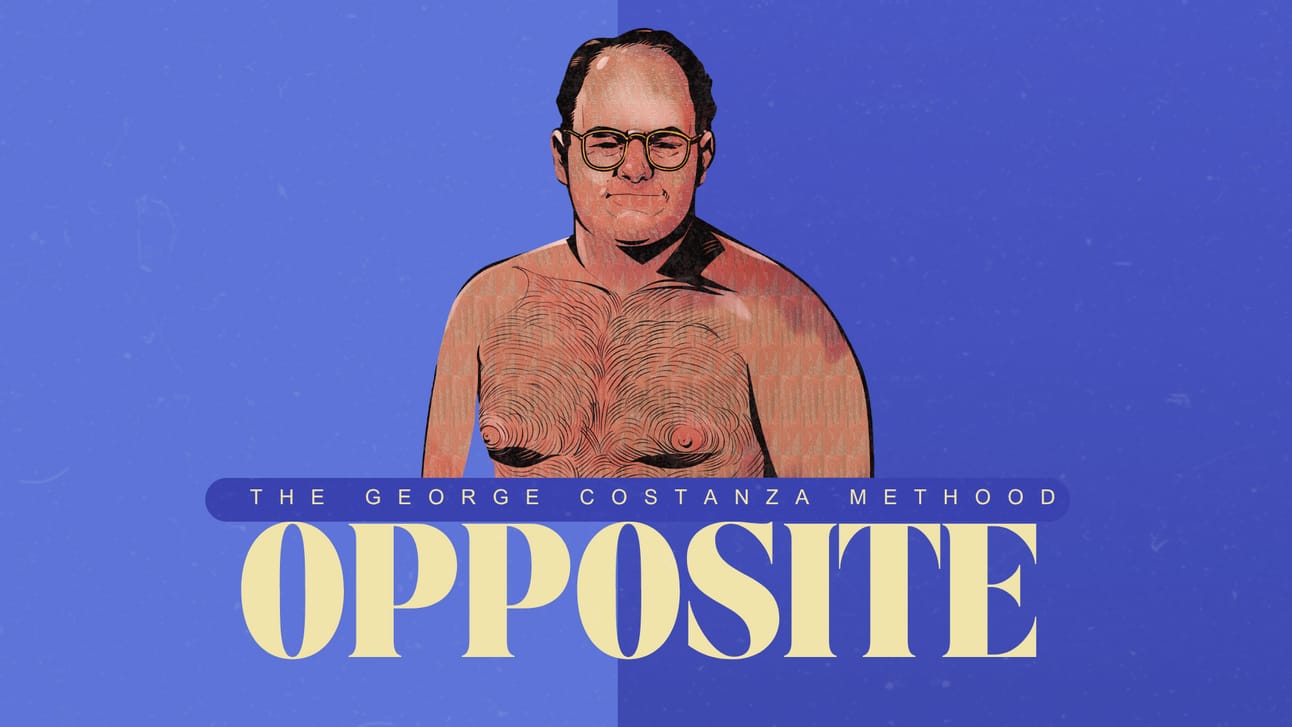
Listen now on Spotify and Apple Podcasts
👋 Hey dumdums,
I'm thinking about one of my daughter's birthday parties from a few years back. She must've been six or seven, and things had devolved, as they always do at kids' birthday parties, into complete chaos. Someone started a game where you have to waddle like a penguin while balancing a plastic cup on your head.
Twenty adults ended up doing this. Not just the kids. The adults.
There's this one dad there, works in hedge funds, always looks stressed, the kind of guy who checks his phone during his own kid's soccer games. And here he is waddling across the lawn with a red Solo cup sliding off his forehead, laughing so hard he can barely breathe. My wife is doing the same thing. There's a lawyer, a couple of teachers, a real estate agent, all these competent, serious people acting like complete idiots together.
I'm standing there thinking, "This is the happiest I've seen these people. Like, ever."
Not at the work conference. Not at the fancy dinner party. Here. Waddling like penguins. Looking absolutely ridiculous.
What if being foolish as a group isn't a sign that humanity is doomed? What if it's actually the most sophisticated thing we do? What if all our best human moments require us to abandon dignity simultaneously?
Let's get dumb.
WHAT HAPPENS TO PEOPLE WHO NEVER LEARN TO PLAY?
Here's something that will haunt you…
In the 1960s, a psychiatrist named Stuart Brown sat across from convicted murderers in Texas prisons and asked them about recess. About whether they played as kids. About games and roughhousing and pretend.
The murderers thought this was weird. The guards thought this was weird. Brown's colleagues definitely thought this was weird.
He was studying Charles Whitman, the guy who climbed the University of Texas tower in 1966 and shot people. The state wanted to understand what creates someone capable of that kind of violence. Brown looked at everything from abuse, trauma, all the usual suspects.
Then he started interviewing other violent criminals. Young men who'd committed serious crimes. Looking for patterns.
He found one nobody expected.
Almost all of them didn't play as children. No roughhousing. No games. No pretend play. No fooling around. Their childhoods were either severely restricted or completely absent. Something he called "play deprivation."
This sounds insane, right? Too simple. But Brown kept digging. Forty years of research. Six thousand interviews — murderers, well-adjusted adults, everyone in between.
The pattern held.
The people who engaged in normal, silly, unstructured play as children, especially play that involved being foolish with other kids, were psychologically healthier, more creative, better at problem-solving, and significantly less violent.
By the 2000s, neuroscience caught up with him. Brain scans showed that play—especially the kind of silly, unstructured, foolish play that involves groups—literally builds neural pathways you can't develop any other way. Social intelligence. Impulse control. Creativity. Empathy. They all require you to practice being stupid with other people.
CREATING FEARLESS ACTORS WITH COLLECTIVE STUPIDITY
Keith Johnstone taught at London's prestigious Royal Court Theater in the 1950s and watched his students get worse the more he trained them. They became stiff, self-conscious, terrified of looking stupid. So afraid of failing they couldn't actually act.
But he had a solution and wanted to try it. He created exercises where the only goal was to fail spectacularly. Tell the worst story possible. Be aggressively boring. Describe your sock drawer for ten minutes. Make "trying to look like an idiot" the entire assignment.
The head of his program told him he was "destroying everything we've built." Critics said he was "celebrating mediocrity."
But his students? They became fearless. They took risks. They weren't paralyzed by dignity. And they learned the secret that would birth the entire modern improv theater movement.
Every comedy show you've ever loved—SNL, Second City, all of it—traces back to Johnstone's radical insight that…
The willingness to be collectively stupid is the foundation of improvisational theater.
MEANWHILE, IN GERMANY...

Hundreds of people are gathering in parks right now to eat pudding with forks.
I need you to sit with that sentence.
Pudding. With forks.
It started in Karlsruhe this August. Someone put up flyers that just said "Come to our We Eat Pudding With A Fork meeting." Hundreds showed up. Now it's viral. Munich, Berlin, Vienna, Paris, Portland (because of course Portland). No cause. No hashtag. No awareness campaign. Just Gen Z looking at wars, climate chaos, economic meltdown, and choosing synchronized absurdity as their response.
One spokesperson in Hanover told a reporter: "The purpose is to let people vent in our current times."
Vent. By struggling with dessert utensils. With strangers. In public.
This isn't nihilism. It's kind of the opposite. It's saying…
"The world is chaotically absurd, so let's be absurd on purpose. Let's do something so pointless it becomes the point."
And if you watch the videos (I've watched too many), everyone looks genuinely joyful. Not Instagram-filtered happy. Actually connected.
This is collective foolishness as mental health.

WHAT HAPPENS IN YOUR BRAIN WHEN YOU GET DUMB TOGETHER?
Here's where it gets wild. Researchers have been studying this stuff for decades, and the data is pretty compelling.
Dr. Barbara Fredrickson (UNC) discovered that one person acting goofy triggers mirror neurons in everyone around them, positive emotions spread like contagion. But there's a catch. Status has to disappear first. Nobody wants to play tag with their boss who's still acting like a boss.
Amy Edmondson (Harvard) studied hundreds of teams and found something that made her think her data was broken. The best-performing teams weren't the buttoned-up professionals. They were the ones where people felt safe being spectacularly wrong in front of each other. Apparently, the key to outperforming Goldman Sachs isn't more spreadsheets, it's karaoke where everyone butchers "I Will Survive” while eating atomic hot wings together.
Dr. Jaak Panksepp found that your brain treats complex problem-solving and horsing around with friends as the same activity. Same neural circuits. Wild.
Dr. Robin Dunbar (Oxford) delivered the knockout punch. The strongest human bonds don't form during important tasks. They form during shared vulnerability moments (ie, dancing badly, singing off-key, laughing at the same dumb thing). Your coworker spilling nacho cheese on themselves bonds you to them more than their stellar quarterly report ever could.
The science is clear:
Collective stupidity isn't wasted time. It's human infrastructure.
Dumb Word of the Day: “Constulting”
Constulting (con-STUL-ting): To act foolish together, to become as great a fool as those around you, to match the collective stupidity of your group.
From Latin con (together) + stultus (foolish). We abandoned this word around the 1700s because we got too sophisticated to admit we needed it. But the behavior never went away. We just stopped having the perfect word for it.
Use it in a sentence:
"Gerald tried to stay dignified at the water balloon fight, but eventually surrendered to constulting and ended up soaking wet like everyone else."
Also: how incredible would it be to have "Constultant" as your business card title? I'm genuinely considering it.
The Collective Foolishness Experiment
Gather at least 3 people. Propose something completely pointless, like eating pudding with forks, speaking only in fake accents for 20 minutes, walking backwards through a park, singing "Row Row Row Your Boat" in four-part harmony at a coffee shop.
Then actually do it. For at least 15 minutes. No ironic distance. No smirking. Full commitment.
The magic only works when everyone surrenders to the stupidity simultaneously. If someone tries to stay cool, call them out. This is a judgment-free idiot zone.
Notice what happens. Notice when the self-consciousness evaporates. Notice when the laughter becomes real. Notice the moment everyone realizes they're equally ridiculous and something shifts.
Bonus level: Do this with people you normally maintain professional distance from. Synchronized foolishness works best when it dissolves hierarchies. Your boss covered in silly string hits different than your boss in a quarterly review.
THE POINT OF ALL THIS
Every culture on earth has figured this out. La Tomatina in Spain isn't really about tomatoes. It's 40,000 people agreeing that for one day, being covered in red pulp matters more than dignity. Songkran in Thailand started as a reverent Buddhist ritual and evolved into the world's biggest squirt gun fight. Holi in India, Carnival in Brazil, Burning Man in Nevada, they're all scheduled permission slips to abandon status together.
Because when you're unrecognizable under colored powder, you can't be “Regional Manager of Sales.” You're just a person. A messy, laughing human who is suddenly connected to everyone else who chose foolishness over polish.
The happiest, most creative, most cohesive groups I've studied all share one feature. They found ways to regularly be ridiculous together.
That's not a bug. That's the entire operating system.
The opposite of foolish isn't wise. It's alone.
And the fastest way to find your people is to agree to look stupid with them.
Stay deliciously foolish,
David 🎉
P.S. — If you're thinking "this sounds nice but I'm too busy/important/dignified for this nonsense," that's precisely the problem. The hedge fund guy at my daughter's party probably thought the same thing. Until he had a Solo cup on his head and remembered what it feels like to be fully, joyfully human.
Dumbify: Dumb Ideas, Delivered Weekly (You’re Welcome).








